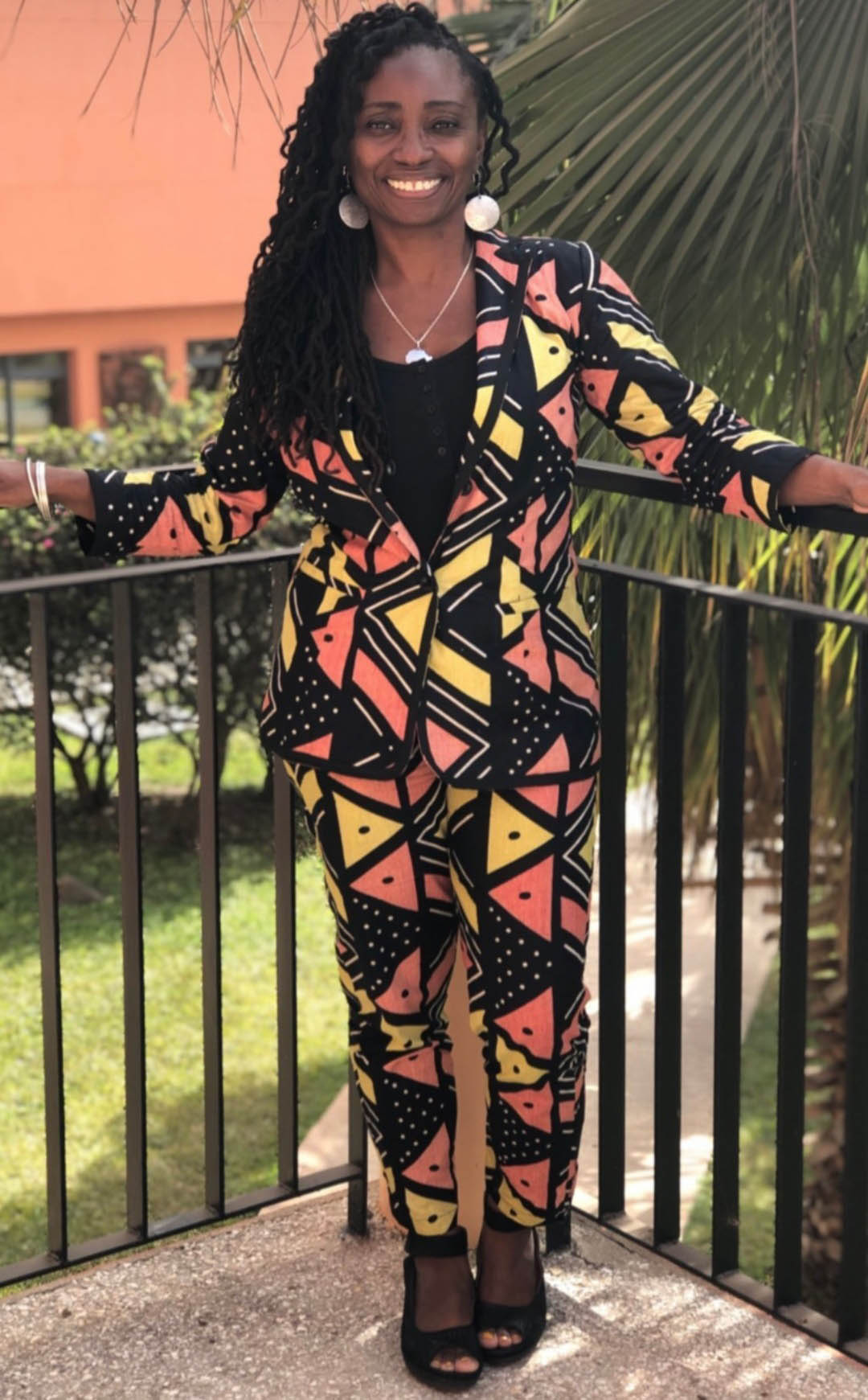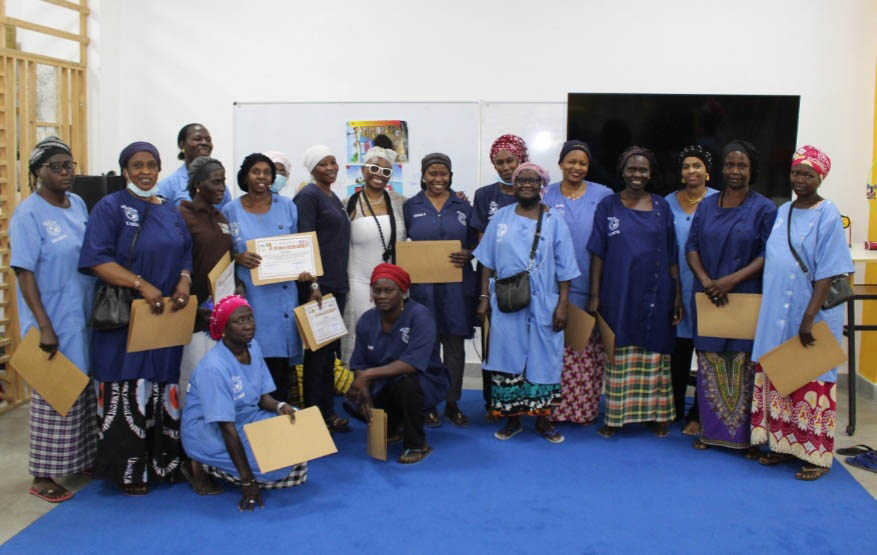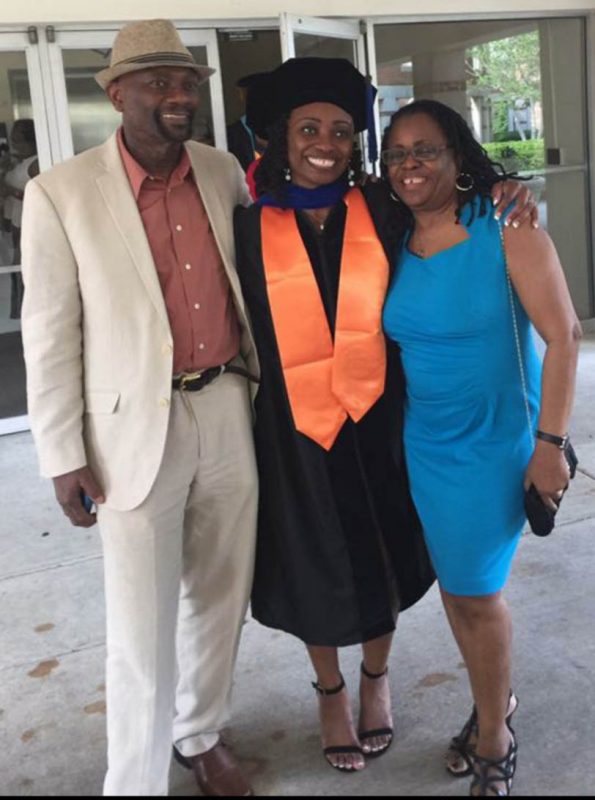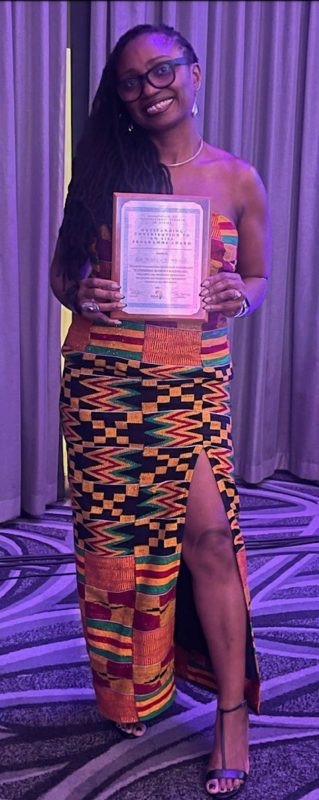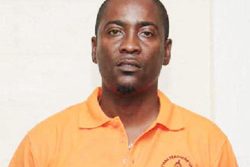By Miranda La Rose
Dr Nneka Johnson, 49, wanted to follow in the footsteps of her parents – her mother was a teacher and her father, a social worker – and was conflicted about her career path, so she pursued studies in both fields and now successfully blends both disciplines in her field of work to better the lives of the people.
“There was always that tension,” the Guyana-born global educator told Stabroek Weekend in a recent interview from her Atlanta, Georgia home. “Then I had an epiphany some 30 years ago. I decided to do educational social work. I shifted focus from sociology and I went to Georgia State University where I did my master’s in instructional technology in 2005 to prepare to work in a school system using innovation and technology to enhance learning among adults and children.” For her educational social work, much of which included volunteerism in design thinking, particularly in Senegal, Africa, Johnson was in early October this year awarded the Association of International Schools in Africa (AISA) Award for Outstanding Contribution in an AISA Programme at a special ceremony in Nairobi, Kenya. She was recently appointed a member of the AISA board of directors and is a member of AISA’s professional learning design team for international schools’ teachers in Africa.
In Senegal she was the International School of Dakar’s representative with AISA. “As an administrator, the teachers trusted me to represent their interests to the board for two years. Then for two years after that, I was on the board as a member of the senior leadership team. I volunteered my time during the summers, during weekends and when I’m asked to provide support. It was nice to be acknowledged for the volunteer work I do. I do it because of my passion for supporting and mentoring people,” she said.
Johnson co-leads a women-in-leadership and affinity group for people in Africa sharing experiences with women who aspire to leadership and women in leadership.
She was also listed among the top 75 top global educational influencers in 2021 by the research organisation, ISC Research because of the equity work she led.
The first fellow with the Council of International Schools (CIS), a premier organisation with some 1,500 member schools around the world, Johnson said, “Learning, imparting my knowledge and caring for people is my passion. As the first fellow, I think my job is huge.”
The position of fellow with the CIS was created to accommodate Johnson. She began working with the CIS in August this year. She works with a team in every department of the CIS to help schools on their accreditation journey. It is a reciprocal learning experience for her and the institution in which they strive to ensure inclusivity in the council’s practices.
The international schools were created for the children of expatriates living in different countries and others who could afford the tuition fees. “No matter what country you are in, no matter the language of the country, the instructions, nine times out of ten, are in English. Most of the students graduating from these schools will go to Europe, the USA or Canada for their university education. The student bodies are also very diverse,” she noted.
She is looking forward to her CIS work and to continue to volunteer with AISA. “I will be in Ghana, Zanzibar and the Netherlands next year and presenting at a conference in England. I’m going to Hong Kong, Japan, Mexico to visit the international schools and to help them with evaluation and meeting their accreditation,” she added. In the course of her work she has travelled extensively.
Johnson was born in Georgetown. In 1977, she moved to Queens, New York, USA when she was two and a half years old.
“I skipped the eighth grade and started college at 16 years old. I was always like the one who sat in front of the class and always raised my hands to answer questions. I started to do computer science but then I shifted to social work,” she recalled.
In 1996, after graduating with a bachelor’s degree in sociology from Queen’s College, City University of New York, Johnson moved to Atlanta, Georgia where it was more conducive to how she wanted to live.
In third grade in New York, when computers were new, her parents had enrolled her in computer science in Brooklyn College.
“It struck a chord with me. Since that time I wanted to work in the field of technology. So I shifted focus to work in technology which led me to work in instructional educational technology for the last 20 plus years,” she said.
Woodward Academy
Her first big job after graduating with her master’s degree from Georgia State University in 2005 was with Woodward Academy in Atlanta, the largest independent coeducational school for some 3,000 pre-kindergarten to 12th grade students in continental USA.
“I was the lead instructional technology specialist. I worked with teachers to integrate technology into the curriculum and taught students how to use technology in learning. We started a bring-your-own-device programme years ago with students. Instructional technology is using any kind of tool, a pencil, a cell phone, a method or a framework, to enhance education. In my instructional technology programme I use design thinking and curriculum,” she said.
Johnson, an advocate of design thinking for the past 11 years, was coursed in the subject at Stanford University.
“Design thinking, an innovative way to solve problems for industries, business and education, has five steps – empathy, define, ideate, prototype and test. It promotes innovation, thinking differently about different things but using empathy as your start-off point,” she explained.
Her career took off on a trajectory when she started working at Woodward Academy. “I worked with teachers. I was into adult learning and teaching children. I visited our sister school in Venezuela twice. That sparked my mind to international education and I felt if you’re working in international education, you have a way to shape global leaders of tomorrow,” she said.
While teaching at Woodward Academy, Johnson visited another sister school in Australia. “There they asked me to return for a year but I went back for six months in 2010 as the deputy director of innovation at the school in Sydney as part of exchange visits. I launched an iPhone, iPad Touch programme and I taught the teachers how to use the iPad and the iPhone in the classroom. It was out of the box and innovative thinking at the time. Woodward Academy held my job for me,” she recalled.
On her return to Atlanta, she taught two courses in teachers’ technology at Shorter University, Georgia.
“I was always teaching technology and teaching generally. Even as a child, I was always that tech savvy person. Formally, I started to teach about 20 years ago during internships on the master’s programme,” she said.
Johnson wanted to be a global instructional technology leader educationally and enrolled at Mercer University where she earned her PhD in curriculum and instruction in 2017.
“My dissertation was on how curriculum can change how students use social media. I interviewed my past students from Woodward Academy who were at the university on what they learned in my classes that made them change how they use social media as adults. [Psychologist Albert] Bandura’s social learning theory came into play. During the Woodward Academy classes, I showed students videos or movies of people suffering consequences because of the inappropriate use of social media. That made them reflect. The study found that my classes helped to change how they used social media in their adult lives. That was a recurring theme I found in all of my case study participants,” she related.
Now artificial intelligence (AI) and online chats have made people become lazier, she said. “We have to learn how to make education more engaging. We have to shift how to teach to use AI,” she added.
In 2018, the year after she graduated with her doctorate, Johnson was the keynote speaker for the doctoral commencement ceremony at Mercer University. “I was the first doctoral graduate the university had asked to speak. It is something I am very proud of,” she said.
Senegal
Once her children graduated from high school, Johnson, the mother of two children and stepmother of four, and her husband decided to work overseas. She applied for administrative jobs internationally, including at the Georgetown International Academy in Guyana.
“I said wow, a job in Guyana. Yeah. The board did not even interview me. The search agency moved me forward. I wanted to go back home and be a school leader,” she said.
Johnson had also applied for the post of director of technology at the International School of Dakar (ISD) in Senegal. Because of her doctorate in curriculum and her experience, when she got the job in 2018, her title was changed to director of innovation.
“For the five years I was in Senegal, my school experience exploded. I covered the information technology department and the library. I organised all professional learning on campus. I was the accreditation coordinator. I worked with the board on strategic planning. I helped with recruitment. I led all diversity, equity and inclusion initiatives for two years, for which we gained worldwide recognition,” she related. “That experience exposed me to doing things outside of technology. Technology then became a piece of what I did. My working experience in Senegal gave me a diverse perspective on all aspects of school leadership and doing things differently at school.”
In Senegal the national language is French but the language of the people is ‘Wolof’.
“I learnt a bit of French but it was difficult because the nationals combine the two languages. I was able to learn enough to ask questions, get answers and get around,” she said.
Johnson interacted with the local non-teaching staff. They invited her and her husband, Joseph Johnson, who is very supportive of her work, to their homes for special occasions like naming ceremonies.
“They respected me because of the diversity work I did. I organised listening sessions for them where they spoke in Wolof. One of the Senegalese staff said she had worked at the ISD for over 20 years and would not even own a house to show for her years of service when she would have retired. Another issue was that the local staff had no opportunities for professional advancement. I worked with the director and the board at the time to change some of the policies to support them,” she said.
With the board’s approval, Johnson sought and received grant funding to hire a company to conduct upgrading programmes in which the local staff were formally trained and certified in electrical works, plumbing and housekeeping.
“For some of them it was the first time they had a certificate in something. I also worked with the board to create a retirement fund that the school invested in. The board took it to another level and made it retroactive. Out of the blue, some staff members had money to buy homes. They received cheques for US$15,000, US$20,000 and the school also helped to build homes for them. Before I left some had actually received the keys to their homes because of the work I led,” she said.
Once at the ISD in a conversation with the director, Johnson suggested setting up an innovation centre, an idea the director put to the board of directors.
“I presented the concept to the board and they approved it. So there is an innovation centre on that campus now,” she added.
In Senegal, she keynoted at several conferences, held webinars, visited schools across the world and helped schools with accreditation. “That excited me about the work I did,” she said. “Senegal reminded me of Guyana.”
The Guyana connection
The eldest of three siblings, Johnson has visited Guyana a few times. “I’m deeply rooted in my Guyanese culture. No matter where I go when someone asks me, what are you, I say I’m Guyanese. I feel I’m Guyanese before I’m American. I was raised in the US but I was raised in the Guyanese ethos. I am all that I am because my parents raised me in that Guyanese culture of perseverance. I was raised with education at the centre. My parents, Derek and Marguerite Saunders (divorced) came to this country at a young age. They both hold master’s degrees. My mother went to teachers training college in Guyana then to Adelphi University and got her master’s degree while working full time. My father worked full time and went to school full time. They inculcated this drive in me,” she said.
In recent weeks, she attended the Guyana Association of Georgia fund-raiser.
“I was just proud to be in that space with Guyanese holding top professional jobs. I just feel that Guyanese have perseverance at their core. We value education and we go for what we want,” she added.
Her desire is to do some philanthropic work in Guyana using her knowledge in technology, design thinking, innovation, education and empowerment through workshops.
“If I get the opportunity I would. It would be giving back to my home, my country. That is my dream. That was why I had applied for the job in Guyana. I get satisfaction from seeing things I’ve done to make people’s lives better; come to fruition,” she said.
Johnson can be found on X and LinkedIn. Her email address is nnekarobinson@gmail.com
